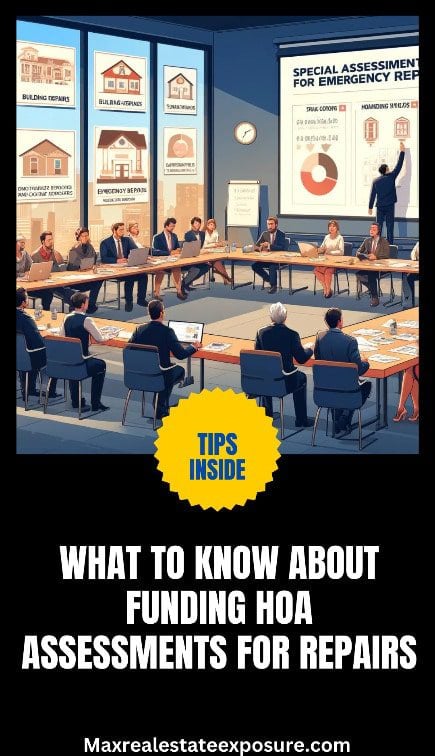 Homeowners’ associations (HOAs) often face the challenge of managing emergency repairs, which can arise unexpectedly and require immediate attention. I will review HOAs’ mechanisms to fund these urgent expenses, focusing on special assessments, reserve accounts, and insurance.
Homeowners’ associations (HOAs) often face the challenge of managing emergency repairs, which can arise unexpectedly and require immediate attention. I will review HOAs’ mechanisms to fund these urgent expenses, focusing on special assessments, reserve accounts, and insurance.
Understanding these financial tools allows a homeowners association to handle sudden repairs without compromising the community’s economic stability.
As a real estate agent for the past three decades and owner of several condos, I understand the impact HOA special assessments can have on people. These are not fun situations to be involved with, and they can crush some folks financially.
Let’s review what an HOA can do when these unexpected expenses rear their ugly head.
Special Assessments for Emergency Repairs
Knowing the meaning of a special assessment and how it works is essential for a potential home or condo buyer.
Understanding Special Assessments
Special assessments are additional charges that an HOA board can levy on homeowners when unexpected repair costs exceed the current budget.
These are essential for covering costs not anticipated in the annual budget. The process typically involves identifying the emergency, calculating the needed funds, and equally distributing the costs among the homeowners.
I have a condo in Florida with a special assessment for replacing the roofs of the condo units. The condo association has spent significant money repairing other items, including fencing and the clubhouse’s roof. There is now a shortfall in the reserve account.
The owners must now face a bill for this work.
Process of Levying Special Assessments
The decision to implement a special assessment usually follows specific steps. First, the HOA board must formally declare an emergency requiring a repair that cannot be deferred.
Next, the board assesses the total cost and determines the amount each homeowner must pay. This decision must be communicated clearly to all members. Depending on the HOA’s governing documents, community or board approval typically requires a majority vote.
Challenges and Considerations
Charging special assessments can lead to discontent among residents, especially if the charges are significant. To mitigate this, transparency about the necessity and urgency of repairs is crucial.
The HOA should provide detailed explanations and justifications for the assessment and clearly outline the payment expectations. Imagine being on a strict budget and finding out you must pay hundreds or thousands of dollars. It’s understandable why someone would be upset.
I advise my clients to carefully review the HOA financial documents before buying a condo. Without doing so, you could make a significant purchase mistake.
I will refer my clients to a specific real estate attorney with experience reviewing the finer details of a condo’s financial report. When buying a condo or a home with an HOA, it is vital to ask the right questions. Your inquiries should center around HOA fees and the community’s economic stability.
When purchasing a condo, looking for financial red flags is always wise.
The Role of Reserve Accounts in Emergency Funding
Importance of Reserve Funds
Reserve funds are savings accounts for future repairs, replacements, and unexpected expenses in an HOA. They are built over time and typically funded by a portion of the regular HOA fees.
A well-funded reserve is critical as it provides financial security and reduces the likelihood of needing special assessments.
Building and Managing Reserve Funds
Effective reserve fund management involves regular contributions and prudent investing. An annual review of the reserve fund and a professional reserve study every few years can help ensure the fund is adequate to cover anticipated expenses.
This proactive approach helps budget long-term repairs and handle sudden financial demands. I recommend you stay on top of this after you make a purchase. Without being in the loop, a community could fall into financial despair without your knowledge.
Joe Boylan, owner of Springs Homes, provided this excellent advice:
“When buying a condo, having a strong reserve fund is more than just a precaution—it’s your peace of mind. I always make it a point to sit down with my clients and dig into the financials of the condo association together. It’s crucial to know that the building is well-cared for and financially sound, not just today but for the future, too. This isn’t just about protecting your investment; it’s about ensuring you’re stepping into a home you can always feel secure about. Through proper research buyers can feel confident they are making an excellent buying decision.”
Utilizing Reserve Funds for Emergencies
In an emergency, the HOA board can vote to use reserve funds to cover immediate repair costs. This action requires careful consideration to ensure the withdrawal does not adversely affect the fund’s ability to cover future planned repairs.
Detailed records of all transactions and decisions should be maintained to support transparency and accountability.
Insurance as a Strategy for Managing Unforeseen Costs
 Insurance is another way homeowners associations can plan for any unexpected events.
Insurance is another way homeowners associations can plan for any unexpected events.
Understanding the Coverage
Insurance policies for HOAs generally cover property damage and liability but may vary in terms of the specific types of emergencies covered.
The HOA must understand its policy details, including deductibles and coverage limits. This will ensure adequate protection against potential emergencies.
Benefits of Comprehensive Insurance
A comprehensive insurance policy can significantly alleviate the financial burden on the HOA and its members in the event of significant damages or liabilities.
This can include everything from natural disasters to accidental damages affecting common areas. Regularly reviewing and updating the insurance policy ensures the coverage meets the community’s evolving needs.
Integrating Insurance with Other Financial Tools
Integrating insurance with reserve funds and the potential for special assessments provides a robust financial strategy for managing emergencies.
This integrated thinking ensures multiple layers of economic security. It helps to distribute the costs effectively and maintain financial stability in the face of unexpected events.
Best Practices for Leveraging Financial Tools in HOA Management
Methods can always be utilized to help fund HOA assessments. Planning for emergencies is always wise.
Strategic Financial Planning
Effective financial management in an HOA involves strategic planning and a proactive approach. HOAs should conduct annual budget reviews and adjust their financial strategies based on current and projected needs.
By integrating reserve funds, insurance, and the potential for special assessments into their financial planning, HOAs can create a comprehensive safety net.
This integration allows flexibility in handling emergencies, from minor repairs to significant construction projects. Regular audits and consultations with financial experts can further enhance the HOA’s ability to manage funds effectively and anticipate future expenses.
Communication and Education
Communication is critical to successful financial management in an HOA.
All members should receive regular updates on the community’s economic health, the status of the reserve fund, and any changes to insurance policies.
Educating homeowners about using their fees and the importance of these financial tools in maintaining property values and community standards can help gain their support for necessary assessments and fees.
Workshops or informational sessions can effectively explain the details of financial planning and the direct benefits to homeowners.
Encouraging Community Involvement
Involving homeowners in the HOA’s financial decisions can lead to more democratic and accepted outcomes. When homeowners participate in discussions about budgeting, reserve funds, and insurance policies, they are more likely to understand and support the necessity of these measures.
Facilitating this involvement involves holding regular meetings, conducting voting processes, and encouraging homeowners to join financial committees.
Building a Cooperative Community Culture
Creating a culture of cooperation and mutual support within the community can significantly enhance the effectiveness of financial management.
When homeowners feel they are part of a community with shared goals, they are more likely to agree to necessary expenditures. With this understanding, they contribute positively to the community’s financial health.
Celebrating community successes and regularly acknowledging members’ contributions can strengthen community bonds and encourage active participation in HOA affairs.
Through my dealings as a Realtor, I have found that HOAs that aren’t transparent usually have issues.
Conclusion
Handling emergency repairs requires careful financial planning and the willingness of an HOA to implement multiple strategies. Although not always popular, special assessments are necessary for immediate funding needs.
Reserve funds offer a buffer that can reduce the frequency of these assessments, while comprehensive insurance provides a safety net against severe financial impacts.
The synergy between these financial mechanisms ensures that HOAs are prepared to handle emergencies efficiently. Educating the community about the importance of these financial tools and maintaining transparency in their application can foster trust and cooperation among members, ensuring the community’s resilience in facing unforeseen challenges.
About the Author: Bill Gassett, a nationally recognized leader in his field, provided the above real estate information on funding HOA assessments for emergency repairs. Bill has expertise in mortgages, financing, moving, home improvement, and general real estate.
Learn more about Bill Gassett and the publications in which he has been featured. Bill can be reached via email at billgassett@remaxexec.com or by phone at 508-625-0191. For the past 38+ years, Bill has helped people move in and out of Metrowest towns.
Are you thinking of selling your home? I am passionate about real estate and love sharing my marketing expertise!
I service Real Estate Sales in the following Metrowest MA towns: Ashland, Bellingham, Douglas, Framingham, Franklin, Grafton, Holliston, Hopkinton, Hopedale, Medway, Mendon, Milford, Millbury, Millville, Natick, Northborough, Northbridge, Shrewsbury, Southborough, Sutton, Wayland, Westborough, Whitinsville, Worcester, Upton, and Uxbridge Massachusetts.


Great article, Bill.
It’s packed with a lot of helpful infor.
Nice work!